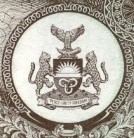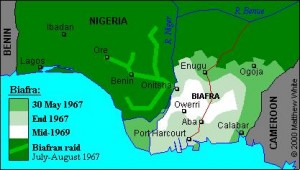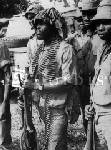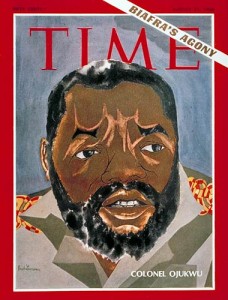By Astra Navigo
(Coat of arms of the Republic of Biafra – 1967 – 1970)
It is better even from the point of survival to fight and be conquered than to surrender without fighting.
— George Orwell
Biafra lives.
— Chukwuemeka Odumegwu-Ojukwu (President; Biafra – 1967-’70)
5 July; 1967.
The day dawned hot and muggy in the thick forest canopy in eastern Nigeria, on the border of the new nation of Biafra. Early June saw the arrival of two Nigerian army artillery regiments, along with two regiments of Nigerian infantry, to the border.
The time had long passed to negotiate the many injustices suffered by the people east of the Niger River. All that was left was war.
The first shells began falling shortly after midnight.
_________________________
Created from necessity, Biafra existed as a response to the arbitrary ‘political construct’ of Nigeria from the ashes of the former British colony of the same name. The three major ethnic groups (Hausa, Falani, and Igbo) had never lived harmoniously; each had their own region; each their own culture, religious beliefs, and ethics.
The Hausa and Falani were more in number, but less-educated. The Igbo, primarily in eastern Nigeria, had a culture of hard work and education. Most of the professional-class of Nigeria, and most of the officer-corps of the army came from Igbo stock; the working-classes and enlisted military personnel from the Hausa and Falani.
This divide was never addressed by the colonial government, nor was it addressed by the Nigerian government which followed independence in 1960. While education was available, it was never pursued as aggressively by the Hausa and Falani.
Through the first of the 1960’s, the social fabric of Nigeria, absent the controlling ‘lid’ of British troops, began to come apart. Igbo’s who worked in the north and west of Nigeria were increasingly the targets of mass killings. Mobs of Hausa and Falani targeted the Igbo minority, first in the ‘strongholds’ of Hausa and Falani territory; then in the south-eastern part of Nigeria traditionally held as ‘Igboland’.
By 1966, the Igbo had had enough.
_______________________________

_______________________________
(Biafran flag – 1967 – 1970)
Igbo from all parts of Nigeria began moving ‘home’ to the south-eastern part of the country. A coup by General Yakubu Gowon in 1966 put a final end to democracy in Nigeria. Not long after, an increase in ethnic violence, targeted toward the Igbo, reached the point of genocide.
In May of 1967, then-Lt. Colonel Chukwuemeka Odumegwu-Ojukwu, (commander of the eastern military district of Nigeria) in concert with other army officers, academics, and politicians, declared the independence of eastern Nigeria under the ancestral name of ‘Biafra’.
Biafra held some pretty important cards in the early stages of its bid for independence.
As a nation, it was better-educated. Most of the nation’s physicians were of Igbo ancestry; the core-cadre of military officers were nearly all Igbo, and the nation’s universities were staffed by Igbo professors.
Their culture of hard work and creativity were also a formidable asset – and combined with their desire for independence and autonomy, would have a telling effect on the longevity of the nation.
Biafra was a nation rich in resources; the country could boast of wood, water, minerals, plenty of arable land, and one of the region’s best deep-water ports (Port Harcourt).
Biafra also had oil.
Most of the nation’s then-known oil reserves, along with the refineries, were in the new nation of Biafra. Nigerian LSW (light sweet crude) is, in some cases, so good that upon extraction it can be put in a ship’s fuel tanks and simply fired with no need of further refinement. This was Nigeria’s single-greatest cash-convertible asset, and with that asset in Biafran control, the future of Nigeria as a nation was seriously in doubt.
Nigeria In Trouble
Mu je Mu Kerkeshe Su,
TuTatara Kayan Su,
Mu Ber Su Suna Kukan Banza.
(We go, we slaughter them,
We destroy their goods,
We abandon them; crying useless tears)
— Nigerian war slogan; translated from Hausa, broadcast at the beginning of the invasion of Biafra; July; 1967
Nigeria was in trouble.
As a nation, they had seen the majority of their talent, plus one of their deep-water ports and their largest single export-item fall into the hands of a people who were now calling themselves a ‘nation’.
They had a large army, but no air force, and a few gunboats to protect their coastline. They were ill equipped to do much of anything save for throwing massive numbers of troops at their enemy – and, as most of the officer-corps were Igbo, they were now squarely entrenched across the Niger, training a new Biafran army to resist any invasion.
The Nigerian government was faced with two possibilities: (1) A protracted war to recover land and assets, or (2) grant Biafra its independence, and become an insignificant neighbor of the new nation.
Nigeria chose to fight.
The initial incursions into Biafra were thrown back with massive casualties. While accurate records do not exist, consistent numbers from a low of 20,000 to a high of 75,000 Nigerian dead are quoted. By July, it was apparent that the Biafrans held the upper hand.
(Biafran troops; 1967)
___________________________
Biafra, for its part, knew from Ojukwu on down that failure was not an option. The Nigerian government, from the very beginning, clearly acted in a manner which left little doubt that the war would be a war of civilian attrition in order to destroy the Igbo people. Resources were secondary; this was a war of tribe-against-tribe, for the freedom of a people.
Biafran troops slashed forward into Nigeria, and came within 25 miles of the capital of Lagos. Rioting and looting broke out; both the British government and the Johnson administration in Washington informed the Gowon government in Lagos that they should remain in place, rather than evacuate Lagos and surrender to the Biafrans. President Ojukwu was anticipating a quick end to the war.
_________________________
(Biafran recruits in training; 1967)
_________________________
Biafran B-26’s bombed Nigerian advance positions in unopposed daylight raids. Biafran technology was minimal, but the Biafran ‘brain trust’ began to be felt in the form of short-range guided rockets which were used to devastating effect on government positions. It was clear that the Gowon government needed an air force.
They were obliged by both Great Britain and the Soviet Union, which sent five MiG-17’s and four Ilushin Il-28 bombers, along with advisors and technicians, to Nigeria. Egyptian and British pilots eagerly flew the MiGs while Nigerian pilots were in training.
Great Britain came to the aid of its former colony with small arms, uniforms, transport vehicles and other aid, along with pilots and technicians.
Biafra received the weapons (including some tanks) from the recently-concluded Six Day War fought between Israel and Egypt-and-its-allies (along with official recognition by Israel); several nations (Ivory Coast, Gabon, Tanzania, Rhodesia, and the Republic of South Africa) officially recognized Biafra as a nation – but material support was not forthcoming from those new diplomatic recognitions.
It is important to note that recognition by the Republic of South Africa and Rhodesia did nothing to endear the Biafran government to the newly-independent African nations, and in reality prevented many African nations from formally recognizing Biafra and coming to its aid due to the apartheid regime in South Africa as well as the ‘whites-only’ government of Rhodesia.
Biafra established a foreign office in Lisbon, Portugal, from which it actively recruited volunteers from many nations in Europe, as well as set about attempting to purchase munitions and arrange for civilian aid. Repeated requests for aid from the United States were met by deaf ears; the Johnson administration considered Biafra to be a ‘side show’, which held little in the way of American interest.
Meantime, the effect of the new Nigerian air force began to be felt in earnest.
The Nigerians began to bomb civilian targets in Onitsha (on the Niger River border) and Enugu; the capital of Biafra had to be moved as a result to a city more-inland (Umuahia). MiG-17’s began shooting down relief planes (clearly marked with the symbol of the International Red Cross); Red Cross relief efforts were suspended as negotiations continued with the Nigerian government to open ‘safe corridors’ for relief flights. While this was ongoing, Biafra began to starve.
___________________________
(Time Magazine cover; President Ojukwu – 1968)
___________________________
Ojukwu, Oxford-educated and one of Nigeria’s wealthiest men in his own right, pledged and spent his personal fortune (around $40M U.S.) for supplies. Ojukwu also used his personal relationships with wealthy Europeans to arrange for supplies and munitions for the new nation. None of this, however, was nearly enough to prevent the Nigerians from invading Biafra.
Ojukwu, declaring Biafran independence; 1967
The Biafran capital at Enugu fell in late September, 1967, after a combined Nigerian air/land campaign. It was during this time that General Murtala Mohammed, a Hausa from northern Nigeria, began his ‘scorched earth’ campaign against Biafra.
At this point, 5,000 Biafrans were dying, daily.
Rapidly, things began to turn against Biafra.
(to be contd.)






Hi. I am a long time reader. I wanted to say that I like your blog and the layout.
Peter Quinn
Peter:
Thank you, on behalf of all of us. This is more than a ‘blog’; it’s an online e-‘zine with some serious writers and editorial management behind it.
As to this article, thank you for reading. Although the story does not have a happy ending, it’s important to remember.
Best,
-Will (“Astra”)
The lessons of history are very important, especially when the details become obscured in a one-sided version of complex events. The reconstruction of Vietnam has been detailed so many times, people tend to believe that was our only lesson in foreign involvement; how a giant country lost against a very small and poor one. John F. Kennedy summed up US foreign policy (and the CIA) as an octopus with its tentacles in every aspect of human affairs, ending he wished to God it didn’t exist in an exclusive Times article, just a few months before he was assassinated. He was assassinated and the octopus grew larger and fatter.
I recently tried to look up on the Internet, the policies of President Portillo for an article on how he affected the peso crash. I was very surprised to learn that he had been painted as a scapegoat by the research opinions; that the peso crash was actually the result of a then unstable Mexican Petroleum stock market. I was there. I worked as a translator for a Mexican/American real estate firm. President Portillo emptied the banks of 600 million dollars in US currency and flew out of the country for parts unknown, causing a mad scramble for US securities. The peso dropped from 23 to a dollar, to 5,000 a dollar within a ten year period, and continued to drop until the government abandoned the peso and created the pesote, firmly regulating its value. I’m reminded of Orwell’s 1984; pieces of memory, of history, dropped into the incinerators of forgetting. We are bound to make the same mistakes over and over if we don’t study our history lessons.
To Peter: We are the anti-bloggers! It is our mission to walk away from redundancies and back into the rich texture of compositional writing. Welcome aboard! We have only just begun our roller coaster ride into thought, sound, life and imagination.
What we have here is a lesson no newly-formed nation can ignore – brainpower alone will only get you so far against an opponent with superior numbers and connections, thus it’s best to get control of as much brute force and cash as possible to even those odds…
I am pleased to see this article by a long time contact from other venues; he is an excellent, well-informed writer and his postings are worth pursuing. Though I consider myself to be well-read most of the information in the current article is new to me. I am bookmarking this URL and expect to find it worthy of daily reading.
Thank you, it is so seldom that we get to the meat of African policy at a country by country level, and indeed it is a lesson about what is necessary to hold a country. Brain power is a definate resource but as we are seeing in the U.S. it doesn’t trump numbers.
I am looking forward to the next part.
Just looking at your post on my brand new Nokia Phone , and I wanted to check if it would let me reply or if it was going to me go to a desktop to do that. Ill check back later to see if it worked.
Wow! This can be 1 of the very best blogs I’ve ever arrive across on this subject. Basically Magnificent
I like this historical write up kudos to Naviga. To all Massob Republic of biafra still lives. R.i.p dim chukwuemeka odumegwu ojukwu (ikemba, ezeigbo gburugburu) i ga adi n’ihi na onye ike adighi anwu anwu.